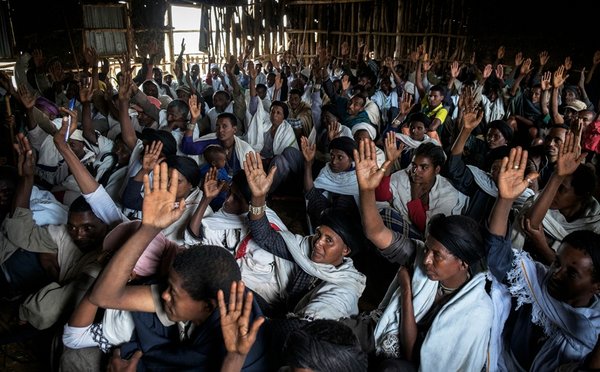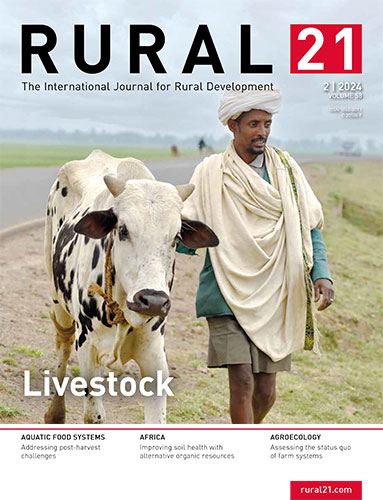 Read this article in French
Read this article in French- Share this article
- Subscribe to our newsletter
A venture with an impact – Helvetas’ Amhara Local Governance Project Plus
Just like throughout Ethiopia, direct involvement of the population in planning processes for basic services exists only at a low level, if at all, in the Region of Amhara. Many people are farmers and self-suppliers who usually only have rudimentary reading and writing skills. They know little about the political processes and who they can contact to address their concerns. Thus communities often remain passive recipients of services without having a say in their prioritisation, or when it comes to precisely what service is to be provided in what manner. Women in particular are only involved in decision-making processes to a limited degree.
Together with the Austria Development Agency, and with the aid of a programme contribution from the Swiss Development Cooperation, Helvetas is supporting village communities in organising themselves in forums. These forums form commissions on the topics of water, health, education, agriculture and transport routes, and comprise various people: men, women, handicapped persons and persons suffering from HIV/Aids, and old and young people. They all learn how to voice their concerns and present issues concerning the entire population.
With the aid of a Helvetas planning instrument, the commissions then develop plans incorporating and prioritising the needs of their community. These plans contain a list of the necessary activities, refer to those responsible for implementation, have a schedule and list the necessary resources and the results to be expected for each activity.
Helvetas supports the members of the forums in this process. The population can thus ensure that the elected and responsible councillors (at different administrative levels) really do take note of their needs. The council members forward the issues, ideas and problems voiced at the forums to the government, so that the latter can take appropriate action. At the same time, Helvetas trains grassroots organisations (such as women’s, handicapped persons’ and elders’ associations) to enable them to participate in the processes as well as service providers who offer the basic services.
75,180 people trained since 2015
Since 2015, in all, around 75,000 people have been trained, including 33,000 women. They comprise:
- 35,610 citizens (15,637 women) are participating in the forums and representing the various groups and minorities.
- 28,131 (12,822 women) elected community or regional councillors learnt how to regularly monitor and control the community development activities and campaign for improved services in the fields of education, health, agriculture, water and roads. They have noticed how important it is to conduct consultation meetings with their voters in order to identify the latters’ problems and priorities. The elected councillors have accordingly started to tackle the issues raised in the consultation meetings. Elected women determinedly present women’s needs and priorities in annual planning and budgetary allocation.
- 7,647 people (3,353 women) in grassroots organisations such as women, handicapped persons, youth and elders’ associations presented the priorities of their groups.
- 3,792 (1,130 women) managerial staff/service providers have learnt how to apply community planning instruments, which is resulting in the faster and more effective provision of services that are specially attuned to the needs of their communities.
Improving infrastructure
Schools, water supply systems and health facilities were improved. Roads were built to create better access to markets and other socioeconomic services. Thanks to the forums and accountability, unnecessary spending was reduced or eliminated.
A total of 371 Kebeles (villages) in 27 Woredas (zones) of the Amhara Region have taken advantage of Helvetas’ community planning instrument and are actively integrating the population in their planning via forums. The community councils have approved 296 community plans, all of which have been integrated in annual planning and the Woreda budgets. Amhara’s Regional Government is working on institutionalising the Helvetas planning instrument throughout the entire region.
(Helvetas/wi)
More information:
Link to YouTube video




Add a comment
Be the First to Comment